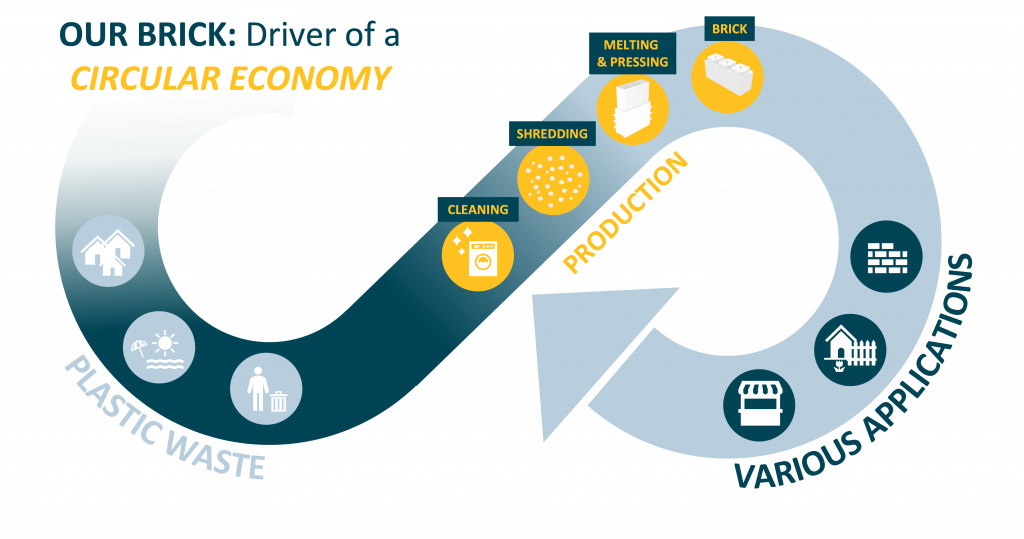Das Projekt Fish’N’Bricks ist Teil der Hochschulgruppe Enactus Karlsruhe e.V. Teil eines weltweiten Dachverbands, der Entrepreneurship für die Umsetzung der SDG der UN fördert. Das Projekt hat eine effiziente Recyclierung des anfallenden Plastikmülls zum Ziel. Dabei fokussiert sich das Team auf niederwertige Verpackungsmaterialien und die Stadt Karlsruhe. Erzeugnisse des Projekts sind Baumaterialien, die zuletzt Bausteine umfassten und nun in Kantenprofile geändert werden, um Zeit und Komplexität zu reduzieren.
Idea
Wir produzieren Ziegel aus Kunststoffabfällen und schaffen so eine Grundlage für eine nachhaltige Kreislaufwirtschaft. Angetrieben von engagierten Studierenden bauen wir ein innovatives Start-up auf, dass das Potenzial dieser nachhaltigen Ziegel eindrucksvoll demonstrieren möchte.
BRICKS FROM PLASTIC WASTE
Unser Ansatz bietet eine doppelte Lösung: Kunststoffabfälle werden nicht nur aus der Umwelt entfernt, sondern gleichzeitig in ein langlebiges, wertvolles Produkt umgewandelt. Dafür sammeln wir Plastikabfälle insbesondere von lokalen öffentlichen Einrichtungen, Gewerbebetrieben und Privatpersonen. Die gesammelten Materialien werden zu Kunststoffbausteinen verarbeitet, die eine Vielzahl von Anwendungsmöglichkeiten bieten.
Was unser Recyclingverfahren besonders macht, ist die breite Palette von Kunststoffen, die wir verarbeiten. Neben PET recyceln wir auch schwerer wiederverwertbare Materialien wie PP (Polypropylen) und LD-PE (Polyethylen mit niedriger Dichte). Dies erweitert die Einsatzmöglichkeiten unseres Projekts und maximiert den Nutzen für die Umwelt. Konkret bedeutet das, dass Fish’N’Bricks nicht nur die Umwelt entlastet, sondern auch zur Schaffung neuer Arbeitsplätze beiträgt.
Darüber hinaus leistet unser Projekt einen signifikanten Beitrag zu den Nachhaltigkeitszielen der Vereinten Nationen – Sustainability Development Goals (SDG) of the United Nations. Zu den relevanten Zielen zählen:
Ziel 9: Industrie, Innovation und Infrastruktur, indem wir Recyclingprozesse in lokaler Infrastruktur fördern.
Ziel 11: Nachhaltige Städte und Gemeinden, durch die Verwertung lokaler Abfälle und die Bereitstellung unserer Produkte für die Allgemeinheit.
Ziel 12: Nachhaltige Produktion und Konsum, indem wir Plastik aus der Umwelt entfernen und sinnvoll recyceln.
Ziel 13: Maßnahmen zum Klimaschutz, durch die Vermeidung von CO₂-Emissionen, da unkontrolliert entsorgter Kunststoff im Ozean Methan freisetzt, ein Treibhausgas mit erheblichem Einfluss auf den Klimawandel.
Ziel 14: Leben unter Wasser, da wir verhindern, dass Kunststoffabfälle in die Meere gelangen und die marinen Ökosysteme gefährden.
Obwohl bereits viele Kunststoffabfälle recycelt werden, bleibt ein erheblicher Teil des Mülls unbeachtet. Schätzungen zufolge sind 20 % der Abfälle nicht eindeutig rückverfolgbar. Fish’N’Bricks setzt hier an, um diese Lücke zu schließen und die Wertschöpfung aus Kunststoffabfällen nachhaltig zu steigern.

Why plastic waste?
Die Verschmutzung der Umwelt durch Plastikmüll zählt zu den größten Herausforderungen unserer Zeit. Als Studierende und VertreterInnen der jungen Generation sehen wir es als unsere Verantwortung, aktiv zu handeln. Mikroplastik hat längst alle Bereiche unseres Lebens und der Natur durchdrungen. Zudem verwechseln Tiere Plastikmüll häufig mit Nahrung oder verheddern sich in Netzen und Verpackungen – ein Schicksal, das oft in einem qualvollen Tod endet. Bleibt die Situation unverändert, wird der Plastikmüll in unseren Ozeanen die Fischbestände in naher Zukunft übersteigen.
Why local?
Langfristig verfolgen wir das Ziel, nicht nur lokal Veränderungen herbeizuführen, sondern auch global einen Einfluss auf die Plastikverschmutzung zu nehmen. Wir beginnen jedoch bewusst vor Ort, um mit lokalem Müll eine innovative, praxisnahe Lösung zu entwickeln, die wir kontinuierlich verbessern und optimieren können. Dieses erprobte Prinzip möchten wir später in Länder übertragen, die besonders stark von Kunststoffverschmutzung betroffen sind. Dazu zählen Schwellenländer, in denen die wirtschaftliche und soziale Lage oft angespannt ist. Bereits jetzt haben wir Kontakte zu NGOs in Indonesien und Tansania geknüpft, die uns bei der Umsetzung unserer Vision unterstützen. Hierbei können wir dann auch das SDG 17 – Partnerschaften zur Erreichung der Ziele, als eins unser Bestreben benennen.
Our story
Fish’N’Bricks wurde im Januar 2019 gegründet. Die Projektidee entstand im Wintersemester 2018/19 während der Innovationsphase des Enactus Karlsruhe e.V. und wurde von fünf engagierten Studierenden entwickelt. Seit unserer Gründung hat sich viel verändert: Unser Team ist deutlich gewachsen, wir haben wertvolle Kooperationen geschlossen, unsere Ideen weiterentwickelt und teilweise bereits in die Praxis umgesetzt. Heute zählen wir rund 20 Mitglieder, arbeiten mit zehn Partnern aus Industrie, Forschung und Kultur zusammen und können auf zahlreiche Erfolge sowie Wettbewerbspreise stolz zurückblicken.